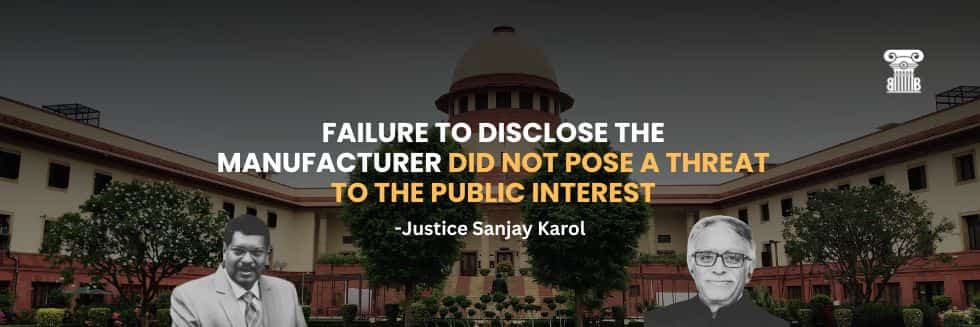The Supreme Court overturned a doctor’s imprisonment for non-disclosure of the manufacturer of medicines deeming it unjustified as the medicines were not intended for sale. In the case of Palani v. The State of Tamil Nadu, Justices B.R. Gavai and Sanjay Karol modified the sentence to a fine of Rs. 1,00,000/- considering the small quantities of medicines in the clinic. The Court emphasized that the failure to disclose the manufacturer did not pose a threat to the public interest and cited precedent to support the decision. Thus, while upholding the conviction imprisonment was replaced with a hefty fine.
CASE DETAILS:
Palani v. The State of Tamil Nadu
Criminal Appeal No. 887 / 2024
Supreme Court
Coram: Justices B.R. Gavai and Sanjay Karol
BRIEF FACTS:
- During an inspection conducted by the drug inspector, it was discovered that a doctor operating a medical clinic possessed 29 types of allopathic medicines without the proper paperwork (license) for sale. Additionally, when questioned about the source of procurement of these medicines, the doctor failed to provide details.
- However, the appellant doctor claimed that the medicines in his possession at the clinic were of small quantity and not intended for distribution or sale.
- The Trial Court, Appellate Court and High Court upheld the conviction of the appellant doctor under Section 18(A) read with Section 28 of the Drugs and Cosmetics Act, 1940. Both these provisions pertain to the disclosure or non-disclosure of the name of the manufacturer.
- The appellant doctor was sentenced to six months of simple imprisonment along with the minimum statutory fine.
- The appellant doctor has now filed a criminal appeal before the Supreme Court challenging this conviction.
OBSERVATIONS:
Initially, the Supreme Court noted that the 29 types of medicines discovered in the appellant doctor’s clinic were in small quantities leading to the conclusion that there was no imminent threat to public interest arising from the non-disclosure of the manufacturer’s name.
Justice Karol highlighted that the failure to disclose the manufacturer’s name did not pose a danger to public interest which is the primary concern addressed by the law in such cases. This observation was supported by the Court’s precedent set in the case of S. Athilakshmi v. State Rep. by The Drug Inspector where a doctor was acquitted for possessing a small amount of drugs as it was not intended for retail sale.
Consequently, the Court deemed it unjustifiable to impose a sentence of imprisonment especially since there was no evidence to prove the intent to sell or distribute the medicines as per Section 18(c) of the Act. Instead, the Court opted to modify the impugned judgment by setting aside the imprisonment sentence and imposing a fine of Rs. 1,00,000/- on the Appellant.
JUDGEMENT:
The Supreme Court overturned the imprisonment sentence imposed for the offence under Section 18(A) read with Section 28 of the Drugs and Cosmetics Act, 1940 pertaining to the non-disclosure of the manufacturer’s name or source of medicines procured for his clinic.
While upholding the conviction, the Court altered the six-month imprisonment sentence to a fine of Rs. one lakh. Given that the doctor possessed only small quantities of medicine not intended for distribution or sale, the Court deemed the imprisonment sentence unjustified.
